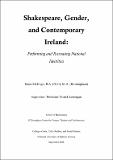| dc.description.abstract | This dissertation explores the performance of Shakespeare by Irish theatre practitioners in Ireland and England at a time of significant biopolitical, social, and legislative change (2014-2018), and as such, approaches such performances through the lens of gender, queerness, and feminisms. Notions, performances, and debates around gender and sexuality shape much of current Irish society, and I contend that this extends towards Shakespeare performance. I also propose that such performances of gender and sexuality are also intertwined with performances and invocations of Irishness, national identity, and Anglo-Irish cultural exchange. Using archival and theoretical methodologies, I display the different forms that Irish Shakespeare takes on Irish and English stages. My case studies include Druid Theatre Company’s adaptation of the Henriad, DruidShakespeare, directed by Garry Hynes (2015); the Abbey Theatre’s production of Twelfth Night, directed by Wayne Jordan (2014); Shakespeare’s Globe’s production of The Taming of the Shrew, directed by Caroline Byrne (2016); and the Almeida/Harold Pinter Theatre’s production of Hamlet, directed by Robert Icke (2017). I explore how these productions perform notions, ideas, and experiences of gender, queerness, and feminisms as they navigate traditions, iconographies, and conventions in Shakespeare performance: whether it is situating Twelfth Night in the context of contemporary Irish queer performance; through cross-gender casting the Histories in the case of DruidShakespeare; interrogating the erasure of women’s histories in Irish commemoration culture where The Taming of the Shrew is concerned; or placing the Irish actor Andrew Scott’s performance as Hamlet within the context of celebrity culture, Hamlet’s performance history, and the performance of non-normative masculinities.
My dissertation demonstrates that more approaches to the study of Shakespeare and Ireland are required than simply literary and historical approaches. Such approaches include examining the impact of external social, cultural, and political influences on Irish Shakespeares; exploring the significance of performing particular plays, especially those with an Irish presence in the text; and considering the influence of British Shakespearean theatrical institutions such as the Globe, the Royal Shakespeare Company, and the National Theatre on modes of performance. | en_IE |


